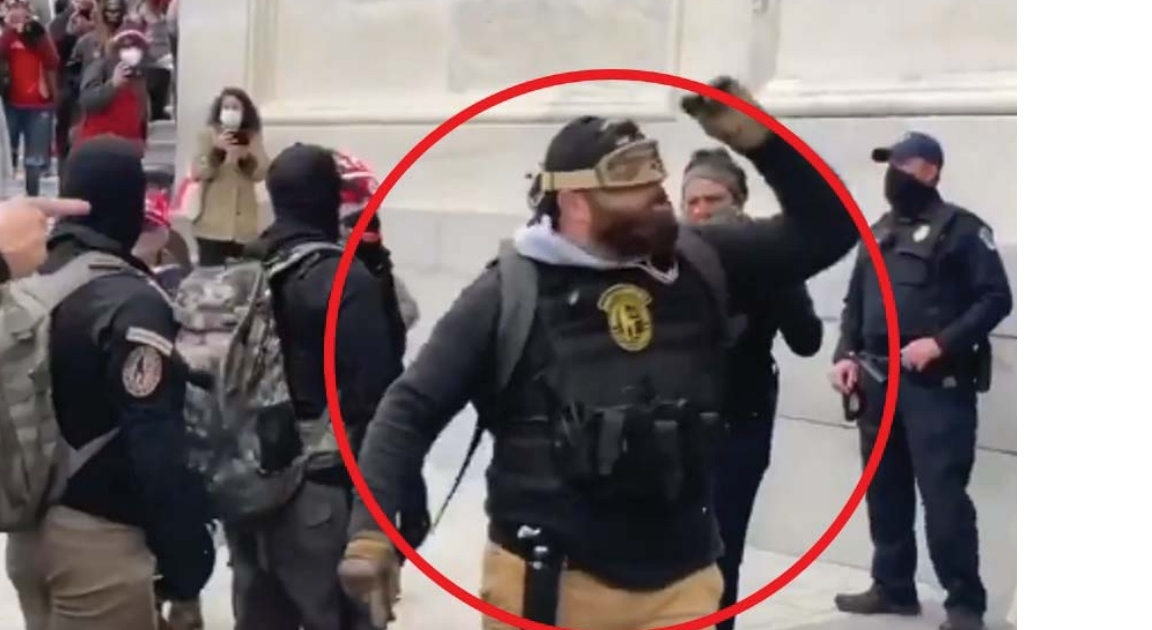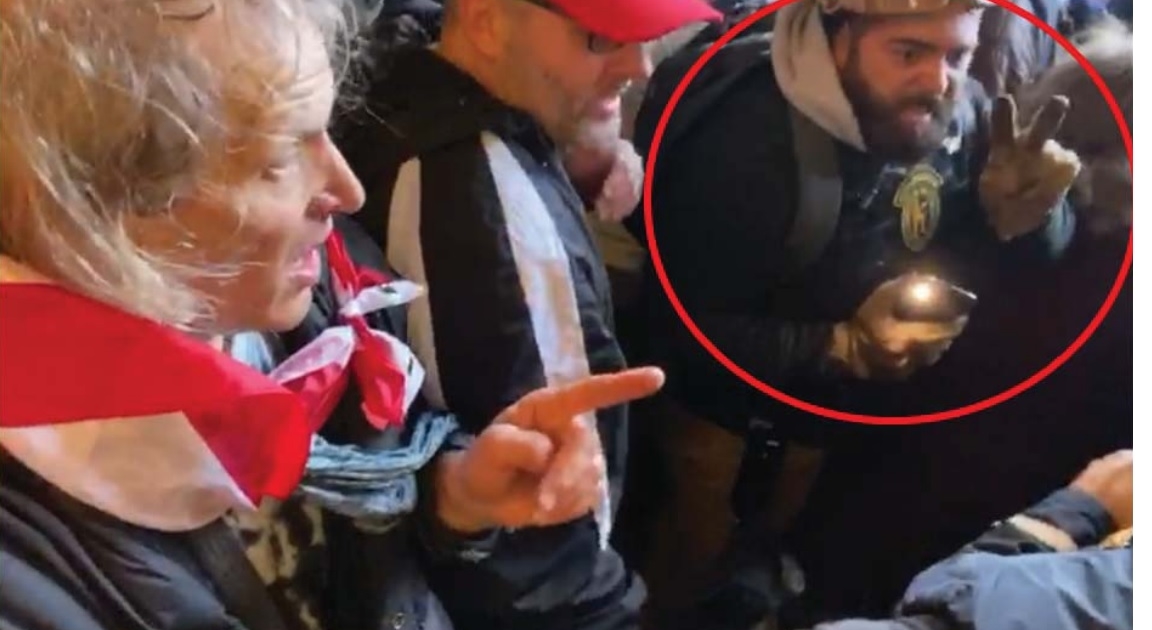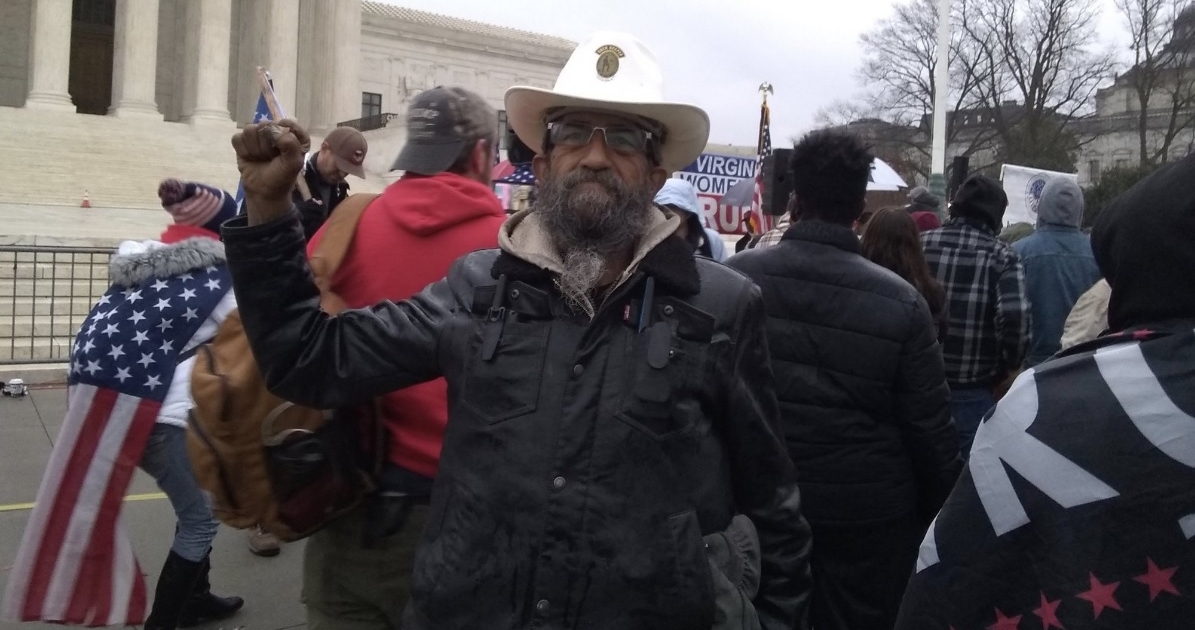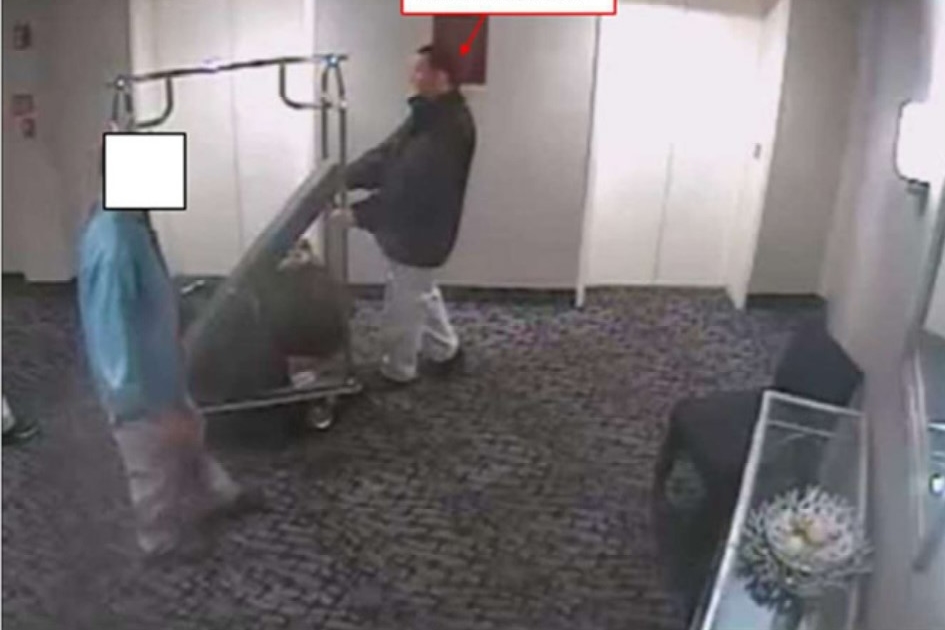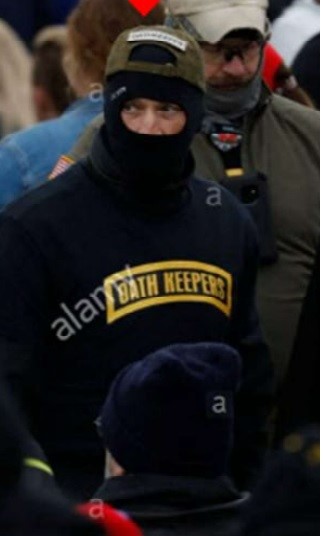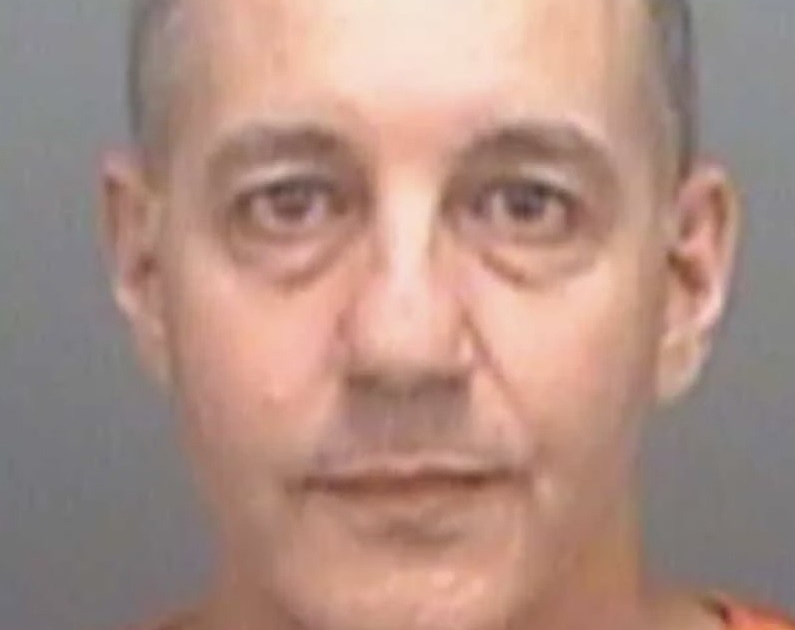After expressing zero remorse and heralding himself to a federal judge as a “political prisoner” who “like Donald Trump only committed the crime of opposing those who are destroying our country,” Oath Keeper Elmer Stewart Rhodes was sentenced to 18 years in prison for his role leading and orchestrating a seditious conspiracy to stop America’s transfer of presidential power by force on Jan. 6, 2021.
It would have been surprising if Rhodes took any other tack when it was his chance to speak.
But Rhodes offered no surprises at the Prettyman courthouse in Washington, D.C. on Thursday.
He was unrepentant, just as he was at trial when he testified on his own behalf for a little over a day. Even then, as a jury actively held his fate in their hands, he publicly smeared proceedings in jailhouse interviews while comparing himself to Nelson Mandela. And just four days ago, in yet another interview from jail, Rhodes kept up The Big Lie.
The 2020 election was fraudulent, he argued, and the U.S. government had launched a “terror campaign” on Jan. 6 defendants. Four days ago he called for “regime change” and in words that could haunt any appeal of his conviction in the future, he added: “We’re going to have to stop it, the American people” and “It’s not going to stop until it’s stopped.”
In his bright orange jumpsuit on Thursday, Rhodes gripped the sides of the podium as he read eagerly from his lengthy remarks, perhaps soothed by the sound of his own voice.
“All Jan. 6 defendants are political prisoners. They are grossly overcharged. A steep sentence here won’t help or deter people, it will make people think this government is even more illegitimate than before,” Rhodes said.
He continued on to issue what sounded like a veiled threat with his voice moving from even and calm to more emphatic as his tone was slightly raised.
“Characterizing Trump supporters as racists, fools and led down the primrose path by Trump as fools doesn’t help either,” Rhodes exclaimed. “My goal will be to be an American Solzhenitsyn to expose the criminality of this regime.”
He said his guilt was “preordained” and told presiding U.S. District Judge Amit Mehta claims that he is a white supremacist should lead him to “sue for defamation.” He said the “regime change” he hoped for a few days ago meant he hoped Trump would win in 2024. He went on a tear about leftist violence and antifa. Rhodes may impress himself or his supporters with such diatribes, but Judge Mehta appeared thoroughly unimpressed. (Mehta has presided over three Oath Keepers trials alone in recent months and his familiarity with this defense is arguably second to none.)
So long did Rhodes’ defiant remarks ramble on that Mehta actually interrupted him at one point and quite politely reminded him that his time speaking was finite.
When Rhodes was finally done, Mehta looked at the Oath Keeper leader. On Thursday, Rhodes met Mehta’s eyes only sometimes. He frequently jotted down notes as Mehta spoke.
“Mr. Rhodes, you are convicted of seditious conspiracy. You are a lawyer. You understand what that means,” Mehta said.
For those who are not, Mehta provided a background. It was true, he said, neither Rhodes nor his conspirators assaulted police. It was true there were those who “did worse” in this regard on Jan. 6 than Rhodes specifically or members of his organization.
But Rhodes is unique nonetheless. The seditious conspiracy he led against the United States is the most serious crime one can commit against this government, Mehta said.
“It is an offense against the government to use force. It is an offense against the people of this country,” Mehta told Rhodes.
The Oath Keeper founder looked right at the judge at this comment.
“This isn’t confined to one day or how you reacted… it is a series of acts in which you and others committed to use force, including potentially with weapons against the government of the United States as it transitioned from one president to the other. And what was the motive? You didn’t like the new guy. I get it. But let me be clear to you, Mr. Rhodes, and anyone else who is listening: In this country, we don’t paint with a broad brush, and shame on you if you do,” Mehta said.
He continued: “What we cannot have, what we absolutely cannot have is a group of citizens who because they did not like the outcome of an election and don’t believe the law was carried out in the way they believe it should be, for them to take up arms and foment a revolution. That’s what you did. Those aren’t my words. Those are yours… you are not a political prisoner, Mr. Rhodes. You are not here for your beliefs or because Joe Biden is president or because you supported the other guy.”
The evidence presented to jurors was convincing beyond a reasonable doubt, Mehta underlined. And though Rhodes has been quick to whine about unfair jurors, Mehta reminded him Thursday that it was this jury that acquitted him of multiple other counts.
“But they found you guilty of sedition. That was a jury of your peers. Make no mistake about it,” Mehta said.
Telling Rhodes the enduring legacy of Jan. 6 belonged to the police and people working on Capitol Hill that day who “protected this democracy as we know it,” Mehta emphasized how law enforcement officers “laid their bodies on the line.”
“You talk about keeping oaths? No one is more emblematic of that than those police officers. Their heroism, their stamina, their courage. But for their acts, it could have been a far uglier day than it already was and it is one of the blackest stains on our country. People shouldn’t forget that,” he said.
In the days leading up to Jan. 6, Rhodes convinced dozens of people to come to Washington, D.C. simply because he called on them to do so, the judge said.
“You sir, present an ongoing threat and peril to this country and to the fabric of this country. You are smart, charismatic, and compelling and that is frankly, what makes you dangerous,” Mehta said. “Anyone think for a moment that Joseph Hackett would come to D.C. with a weapon to fight in the streets? That only happens because of you, Mr. Rhodes.”
Everyone Rhodes called to D.C. for Jan. 6 was a victim of the “lies and propaganda” he shared. It would have been one thing, the judge noted, if Rhodes had looked at what happened on Jan. 6 and said anywhere in his communications with Oath Keepers or in public that it wasn’t a good development. But he didn’t. He celebrated the carnage.
And just three days after the attack on the Capitol, Rhodes wasn’t dialing it back.
At trial in November, Jason Alpers, a military veteran and government witness, testified that he met with Rhodes on the night of Jan. 10 in a parking lot outside of an electronics store. Alpers said he was asked to meet with Rhodes by one of Alpers’ former employees. Rhodes, Alpers said, wanted to pass a message to Trump.
Uneasy about the meeting from the outset, Alpers secretly recorded Rhodes. The recording was played for jurors.
“If he’s not going to do the right thing, and he’s just going to let himself be removed illegally, then we should have brought rifles,” Rhodes told Alpers. “We could have fixed it right then and there.”
Rhodes said he would have hung then-Speaker of the House Nancy Pelosi from a “fucking lamppost.”
The Oath Keepers defense has hinged almost entirely on the claim that members did not come to the Capitol on Jan. 6 to foment violence, but to act as a “security detail.”
After the judge read Rhodes’ own words back to him from that Jan. 10 meeting, Mehta noted: “Doesn’t sound like you were there for a security detail.”
Mehta pointed to Rhodes’ comments during a “Freedom Corner Rally” broadcast from the jailhouse four days ago and how Rhodes said, “at the risk of another charge, I’m going to leave it at that” after he mentioned finding a “way to fix this” situation for Jan. 6 defendants.
With just a hint of exasperation, Mehta told the 58-year-old: ”Nothing has changed, Mr. Rhodes. Nothing has changed.”
“The reality is, based on the words we hear you speak, the moment you are released, you will be prepared to take up arms against your government. Not because you think the wrong president is in office but because you think that is an appropriate way to have redress of government when the law is applied in a way you don’t think it should be,” Mehta said.
And then perhaps encapsulating the very gravity of his decision, Mehta told Rhodes that when the Oath Keeper found himself in a bad place, “everyone else did too, leaving everyone as objects of his willingness to engage in violence.”
“And we just cannot have that in this country,” Mehta said.
In an interview during a break in proceedings Thursday, U.S. Capitol Police Officer Harry Dunn told me it was clear that Rhodes had no remorse.
“He didn’t care how much time he got,” Dunn said.
The sentence brought him little comfort, he said.
Rhodes is “misguided,” and he is fixated on assigning himself labels, Dunn said. Rhodes picked “political prisoner” as his label because he certainly wasn’t going to choose the more accurate one of “insurrectionist,” Dunn said.
If Trump is elected in 2024 or Ron DeSantis wins the White House or there is any political candidate that has sympathy for seditionists, Dunn expects there could be pardons for Oath Keepers in the future. DeSantis has already said he would consider them. Including one for Trump.
“That’s why we need to make sure they don’t get the opportunity to pardon them. That’s why we have to have people vote for people who aren’t insurrectionists or seditionists. There is a possibility it could happen we have to make sure it doesn’t. We the American people,” Dunn said.
Rhodes’ sentence gave him little solace. Dunn said while it was abundantly clear to him that Mehta understood the threat Rhodes poses to society until there is also accountability for Trump, lawmakers, or even some of the influencers involved with undertaking or promoting the violence and destruction of Jan. 6, he genuinely worries about what is ahead.
“My heart and mind still wander about this looming threat. It’s hard to find comfort knowing this threat still exists,” Dunn said.
A day prior, when Dunn delivered a victim impact statement to the defendants, Rhodes rarely looked at Dunn. He was writing notes most of the afternoon. On occasion, he did look up though his face was expressionless.
Dunn described how the violence on Jan. 6 upended his life and left him, nearly 900 days later, “a shell of his former self,” Rhodes didn’t look up then. Then Dunn uttered three words that snapped the extremist leader right to attention: “real oath keepers.”
Dunn was describing how on the day he testified at the Oath Keepers trial, he was originally scheduled to speak to first responders. But instead of talking to them—“real oath keepers, real victims”— he had to testify instead and tell the jury about “what actually happened” on Jan. 6.
Dunn turned to look right at the defendants when he said this. Rhodes looked back at Dunn. His head was already cocked to one side but the “real oath keepers” remark prompted Rhodes’ neck to crane downward even further. He didn’t blink. He seemed to bristle instead, though he kept it just barely under the surface.
Tasha Adams, who recently won her divorce after a years-long estrangement from Rhodes, told me in an interview Thursday that she thinks Rhodes is “incapable” of feeling remorse.
“He only ever adjusts his version of reality to fit into his personal storyline. He believes he has done nothing wrong, that he has been wronged himself, and that someday he’ll get even,” Adams wrote in an email.
In court Thursday, Rhodes was “speaking to get the attention of DeSantis and Trump,” she said.
“He is in this for the pardon and the long game, even if that is not 2024. Even if it means 2028. He is not sorry. He is only sorry it wasn’t bigger,” she wrote.
As for Adams, there is closure with the sentence.
She has been outspoken about her now ex-husband as she watched the trial from afar. She has publicly described his history of abusing her or isolating her. And when the government submitted its sentencing proposal, prosecutors included excerpts of an interview with Adams where she described the depths of Rhodes’ abuses against her and their children.
“There was always violence in little ways. If he was really mad over something, he would want to do what he called martial arts training which included sticks and knives with a dulled edge or a knife with its edge taped. He would usually hurt us when he would do this training and it would always wind up with whoever he was angry at at the time. It was never just rough training or when he was happy with you… I don’t know if you can see all the scars on my arms. That’s from knife training. He would keep me pinned down in a chair….and he would hit the chair or sofa next to my head when he was upset with me,” she told Assistant U.S. Attorney Kathryn Rakoczy.
“[I have] closure in that I know at least we have a couple of years of peace. I’m more focused on getting passed this next election, but at least we are all in the clear for a while. It is also a statement. It says that Stewart is definitively not a good guy. Which is extremely powerful to me, after decades of people telling me what a good man is and how lucky I am,” Adams said Thursday.
Today, her children are happy and relieved, she said.
“They were of course hoping for 25 years. But 18 is pretty solid. I think they’re mostly glad to just not have to think about him for a while,” Adams wrote.
I also asked Adams what the big takeaway was for the day or what she thinks society can do to move away from extremism.
“That is a very big question. I wish we could find a way to move away from the fear of change. I really believe that is what extremism is deeply rooted in. Extremists are a group of people whose self-worth is completely entangled with a way of life that society has grown up and left behind. We don’t need those old belief systems of race, and gender and control anymore. And yet they truly they believe they will cease to exist in any meaningful way without them. I don’t know if there is a way to solve it, beyond time and communication (whenever possible,)” she wrote.
Judge Mehta also sentenced Rhodes’ 54-year-old co-defendant Kelly Meggs to 12 years in prison on Thursday. Meggs was found guilty of seditious conspiracy, too. (Rhodes was also convicted of obstruction of an official proceeding and tampering with documents and proceedings. Meggs was also found guilty of conspiracy to obstruct a proceeding, obstruction of an official proceeding, conspiracy to prevent an officer from discharging their duties, and tampering with documents or proceedings.)
Meggs cried several times as he spoke in court, reeling at the pain he said he caused his family. Many of his family members, including his sister and son, attended the hearing. No one showed up for Rhodes. The moment Meggs’ sister, Crystal, approached the podium to provide character testimony, Meggs began to weep. His face turned red and his shoulders shook as he cried. A marshal handed him a box of tissues.
“I truly apologize for being here,” Meggs said, choking through tears. “It has not only ruined my life but the life of my entire family.”
Meggs’ son, Zachary, asked Mehta to show mercy on his father. His father put him through college and employed him at a car dealership, he said. Without his father at home, he fears he won’t be able to keep the family’s house.
Meggs’ wife, Connie Meggs, was tried separately and found guilty in March for obstructing an official proceeding. Connie was one of several Oath Keepers who breached the Capitol in a stack formation on Jan. 6.
Zachary is getting married soon and he told Judge Mehta he “would really like to have my father at the wedding.”
Meggs’ lawyer, Stanley Woodward, also represents Connie Meggs and as such, didn’t find it prudent to read a letter she wrote in support of her husband in court. Meggs, as he cried, said his “deepest regret is the pain I’ve caused my wife.”
“I have failed her. I have caused my wife more pain than she should ever deserve, incarceration and home confinement for two years all because of me,” he said.
Meggs also lamented how he lost his life as he knew it, including things like cars and retirement accounts.
“Everything has been taken away… I’ve been taken away from my family for 828 days. I want to apologize to everyone I’ve let down,” Meggs said amid tears.
Meggs also addressed Officer Dunn who was seated in the pews behind him. Though Mehta said neither the jury nor he ever found any evidence to support the claim by Oath Keepers at trial that they were “helping” Dunn on the 6th, Meggs nonetheless circled around that unsupported claim once more Thursday.
Then he apologized.
“Officer Dunn, if my presence in any way affected you, I do apologize, sir,” Meggs said before a U.S. Marshal quickly approached him and told him to turn around and address the judge. Defendants are not allowed to turn to address people in the pews.
During the trial, prosecutors showed jurors a patch Meggs wore on Jan. 6. It read, “I don’t believe in anything, I’m just here for the violence.”
Before he was sentenced, Meggs said yes, he did wear a patch that said “I’m just here for the violence.”
“I wasn’t there to cause violence or instigate violence. I was there to keep the violence from happening to anyone. It’s what I had done so many times before and what I was doing that day,” Meggs said.
Whether he forgot or omitted it for convenience, Meggs did not mention the front half of the slogan: “I don’t believe in anything.”
Meggs admitted the language he used in numerous texts and Oath Keepers communications was vile, but he chalked it up to hyperbole.
And as to his own public comments about the trial—which have included the assessment that it is “bullshit” and that the jury is biased—Meggs said only: “I don’t blame them for having bias. I would too if my town had been locked down for some violent event but I still think they were biased.”
In truth, the jury was vetted for bias extensively by both prosecutors and the defense, and in the end, the final verdicts were a mixed bag of acquittals and convictions.
Mehta addressed Meggs directly before sentencing him.
There may have been dispute by the defense about whether Meggs was looking for Nancy Pelosi once inside the Capitol on Jan. 6, for example. But while on this day he called that language unfortunate and hyperbolic, nonetheless, “there was a lot of it,” Mehta said.
Witnesses at trial described how Meggs went searching for Rhodes on Jan. 6 and turned to him for direction and leadership. Meggs also led efforts to coordinate and establish a huge arsenal of guns to be held at a hotel in northern Virginia, just outside of Washington, D.C. This was what Oath Keepers dubbed a “quick reaction force” or QRF.
Mehta was at times incredulous with Meggs’ defense.
If Oath Keepers were there for security, why did they need the QRF? If the Oath Keeper talk was bombast and just bombast—well, Mehta said, he could understand a person believing that to be the case with one message.
But two? Or three?
“I don’t know how anyone can stand here today and say this is just bombast. You were telling others on this ‘OK FL hangout chat,’ you were prepared to die and that’s what patriots did by the thousands,” Mehta said.
And like he told Rhodes during his sentencing, it didn’t sound like Meggs was part of any security detail; the jury didn’t believe that and neither did he. Meggs didn’t even step foot in the area he claimed he was slated to be in to provide security, the judge added. And it didn’t help matters that Meggs had discussed bringing Proud Boys to D.C. to act as force multipliers on the 6th.
The former chapter leader may disagree with the jury’s decision and that’s fair, Mehta acknowledged.
“But we have a process like this for a reason. In the mind of the 12 people in that jury, beyond a reasonable doubt, you committed conspiracy offenses in many ways that day,” Mehta said.
The pain Meggs expressed in court was tangible and the judge said he felt it deeply.
“I have felt it deeply with every sentence I’ve made in connection to [Jan. 6] cases,” Mehta said.
He added that he still finds it “astonishing how average Americans somehow transformed into criminals in the weeks before Jan. 6.”
“In contemplating violence to prevent the transfer of power: maybe you were just under the spell of Mr. Rhodes. I don’t know. Even today, I get it. I don’t really blame you for it. Unlike Rhodes, who I think poses a real threat, you’re not in the same category but you do continue to say things that are not consistent with reality,” he said.
This February, Meggs said in a media interview that police had invited people inside the Capitol and that he thought it was acceptable for him to walk through the door. Mehta also underlined the absurdity of Meggs’ claims that somehow if there was just more closed-circuit footage from the 6th made public, he would be absolved.
That blurs the fact that there was access to every single hour of his conduct that day, Mehta said.
In the end, Meggs still opposed the U.S. government by force.
“We have a process,” Mehta underlined. “It’s called an election. If your guy or gal loses, you hope for better results next time. You don’t take to the streets or join in for a war in the streets. You don’t rush into the U.S. Capitol with the hope of trying to stop the electoral count.”
On Friday, Rhodes’ and Meggs’ co-defendants Jessica Watkins and Kenneth Harrelson will be sentenced. Fellow co-defendant Thomas Caldwell’s sentencing date was originally set for this Wednesday but it was vacated on Monday as Judge Mehta awaits a ruling from the circuit in another Jan. 6 case that will provide a definition of the “corruptly” requirement in the obstruction of an official proceeding statute.
